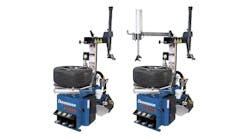Vic DeIorio, executive vice president of GITI Tire (U.S.A.) Ltd., addressed the issue of Chinese tire imports during the U.S. International Trade Commission's (ITC) hearing on June 2.
See U.S. International Trade Commission hears Chinese tire case, posted earlier today, June 3, for more details.
"We fill a critical need in the U.S. tire market, providing high-quality and safe tires at price points that average, hard-working Americans can afford," he told the ITC. The transcript of DeIorio's statements is as follows:
"I want to focus my comments today on the decisions and the planning of the U.S. domestic tire industry in the past few years. As background, the tire imports you are investigating are overwhelmingly sold to the replacement tire market, as opposed to the original equipment market. The U.S. replacement market is segmented into three tiers -- in short, 'premium/mid-range/value' -- otherwise referred to as Tier 1, Tier 2 and Tier 3.
"Our tires serve the Tier 3 'value' market. This segment of the market exists because many Americans cannot afford expensive brand-name premium tires. Many of these Tier 3 tires are private brand tires -- that is, tires manufactured for an exclusive distributor or a specific channel of distribution. For Tier 3, the brand name is not necessarily the name of the producer, and is not associated with the brand equity of the producer.
"Since about 1995, many U.S. tire manufacturers have adopted a business strategy to ensure long-term competitiveness by exiting U.S. production for the Tier 3 replacement tire market in order to concentrate on the more profitable, higher-end tiers (which also allows them to simultaneously highlight their flagship brands).
"In many cases, these same companies started importing Tier 3 tires into the U.S. and selling them under their own brand or label, or as exclusive brands. I can remember when this first started occurring around 15 years ago, when a major U.S. producer made this shift. This is when I first moved into supplying imports to meet that demand. Some other examples are Cooper Tire & Rubber Co., which has moved some of their production to Kenda in Taiwan, and Goodyear, which supplies Tier 3 tires to Wal-Mart under the Douglas label. Some of these tires are manufactured in Venezuela and Poland.
"Most U.S. producers of these tires exited the Tier 3 market proactively, because it was their strategy to concentrate on higher-end market segments (Tier 1 and 2 and the OEM market). As a result, many tires you are investigating are being 'pulled' into the U.S. by the domestic industry and the rest are filling a void created by the ramping down of production by the domestic industry for the Tier 3 market.
"This timing is key. The major U.S. producers' decision to abandon U.S. production capacity for the Tier 3 market preceded, rather than followed, major increases in Chinese imports. In this regard, you will note that most of the plant closures cited in the petition occurred during 2006 as a result of business decisions by U.S. producers to exit the production of low-end tires -- decisions made years earlier. It was at this point, in 2006, that imports of tires from China started to grow by approximately 35% on a value basis.
"The most significant growth in China's share of tire imports did not begin until 2007. China's share of the import market rose to almost 30% in 2007 and grew further to 33% by 2008. However, in the 2007-2008 period, only Goodyear's Tyler, Texas, plant closed, and that closure was the result of Goodyear's mid-2006 decision to exit the private label business, which preceded this growth in imports from China.
"Again, this change in supply pattern was the result of a deliberate decision by the domestic industry to basically discontinue production of Tier 3 tires in the U.S."


